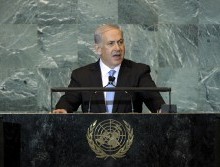Five-and-a-half years after Hamas took over the Gaza Strip, Israeli Prime Minister Benjamin Netanyahu pointed to the risk the terror group could also overrun the West Bank as a key reason to approach peace negotiations with the Palestinians with caution. In comments released by his office on Tuesday, Netanyahu recalled Hamas’ gains after the Israeli withdrawal from Gaza, saying, “Everyone knows that Hamas could take over the Palestinian Authority [PA]. It could happen after an agreement, it could happen before an agreement, like it happened in Gaza.”
PA President Mahmoud Abbas and his Fatah party currently control the West Bank, but have been in discussions for well over a year to reconcile with Hamas. The Gaza-leading faction kicked Fatah out of the Strip in a bloody coup in 2007.
Netanyahu highlighted the wave of political change that has overthrown the government of Egypt and is threatening the Syrian regime in noting that the PA could also face a similar fate. The threat that Hamas, a terror group funded and armed by Iran that has fired thousands of missiles at Israel, could find a home base in the West Bank is one reason why Netanyahu is taking a strong stance on security needs in any territorial compromise peace deal with the Palestinians.
“As opposed to the voices that I have heard recently urging me to run forward, make concessions, [and] withdraw, I think that the diplomatic process must be managed responsibly and sagaciously and not in undue haste,” Netanyahu was quoted as saying. “Otherwise a third base for Iranian terrorism will arise here, in the heart of the country. Peace can be achieved only when security is assured.”
Negotiations between Israel and the Palestinians have been at a standstill for more than two years after a brief resumption during a 10-month partial freeze on settlement construction. However, the Palestinians waited until the building moratorium was nearing its end before agreeing to enter direct talks with Israel and then suspended the discussions when Israel refused to extend the settlement gesture.
The current situation between the sides has hit something of a low point following the Palestinian decision to seek an upgrade in their status at the United Nations outside of negotiations with Israel, which the UN General Assembly ultimately granted them despite disagreement from the US, Canada and others.
(By Joshua Spurlock, www.themideastupdate.com, January 3, 2013)

